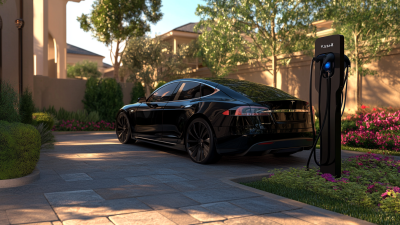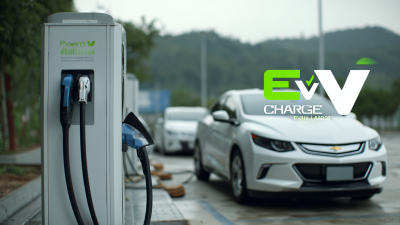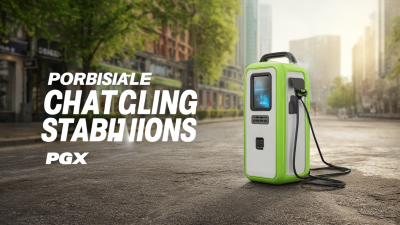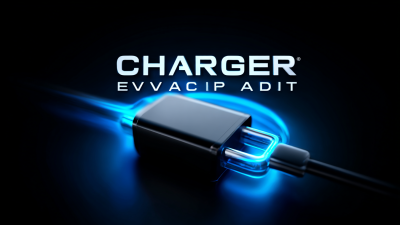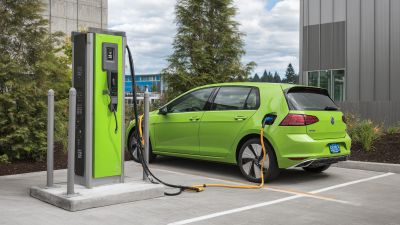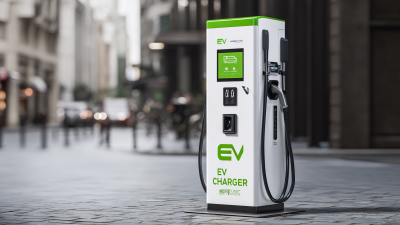In today's electric vehicle (EV) landscape, the importance of having a reliable and efficient Portable Home EV Charger cannot be overstated. As more individuals transition to electric vehicles for their eco-friendly benefits and cost savings, the need for a practical charging solution that can adapt to their lifestyle becomes paramount. Whether you’re a daily commuter, a weekend road-tripper, or someone who requires a charging solution for multiple vehicles, selecting the right Portable Home EV Charger tailored to your specific needs is crucial. This guide will walk you through the key considerations, features to look out for, and the benefits of choosing a portable charger that fits your home infrastructure and charging habits, ensuring that you make an informed decision that enhances your EV experience.

When selecting a portable home EV charger, there are several key features to consider that can significantly enhance your charging experience. First and foremost, the charging speed is crucial; many models now offer levels 1 and 2 charging options. According to recent industry reports, level 2 chargers can deliver up to 25 miles of range for every hour of charging, making them a preferred choice for most EV owners. Understanding the compatibility with your vehicle is also essential. The majority of chargers support common EV models, but some may require adapters for specific brands.

Another important aspect is the portability and design of the charger. Many users look for lightweight and compact models that are easy to store and transport. A survey outlined in a recent market analysis highlighted that over 70% of EV owners prioritize portability when choosing a charger. Additionally, features such as water resistance and a durable casing can provide peace of mind for outdoor use. Lastly, smart technology capabilities, like app integration for monitoring charging status and notifications, are becoming increasingly popular, making the charging process more convenient and efficient for everyday use.
As the use of electric vehicles (EVs) surges globally, the demand for portable home EV chargers is becoming increasingly important. The market for electric vehicle supply equipment (EVSE) is projected to grow significantly, with estimates predicting an increase from $68.72 billion in 2024 to $658.2 billion by 2032, at a remarkable compound annual growth rate (CAGR) of 32.6%. This growth emphasizes the urgent need for effective and versatile charging solutions that cater to a variety of consumer needs.

When choosing a portable home EV charger, it is essential to understand the various types available and their specifications. Currently, the lack of standardization in EV charging connections presents a challenge for consumers. Various charging options exist, from Level 1 to Level 3 chargers, each with distinct capabilities and compatibility considerations.
The evolution of these devices is driven by the global push towards reducing CO2 emissions and enhancing fuel efficiency, which makes it critical for prospective EV owners to be informed about the best choices for their specific situations. The landscape of EV charging is diverse, reflecting the growing market and the technology's ongoing development.
When choosing a portable home EV charger, one of the most critical factors to consider is charging speed. Charging speed, determined by the power output of the charger, directly impacts the convenience of your electric vehicle ownership experience. A faster charger can significantly reduce the time your vehicle needs to spend plugged in, allowing for more flexibility in your daily schedule. For most home settings, a Level 2 charger is recommended, as it typically provides a power output between 240 volts and 40 amps, which can add around 25 to 30 miles of range per hour of charging.
It's also essential to understand the various charging specifications and the compatibility with your vehicle. Different electric vehicles have different charging capacities, meaning not all chargers will work optimally with every model. If you frequently take long trips or have a busy lifestyle, investing in a charger with higher amperage and faster charging capabilities can provide significant benefits. Analyzing your daily driving habits and evaluating the available power supply in your home can help you choose the right charger that aligns with your needs for speed and efficiency.
When selecting a portable home EV charger, understanding the factors that influence its price is crucial. One major aspect is the charging speed. Fast chargers, typically capable of delivering higher kilowatt outputs, come at a premium compared to standard chargers. This is because faster charging can significantly reduce the time you spend waiting for your vehicle to power up, making it a desirable feature for many users.
Another important factor is the build quality and safety features of the charger. Higher-priced models often incorporate advanced safety mechanisms, such as overheating protection and surge protection, ensuring the longevity of both the charger and your electric vehicle. Additionally, brands that have established trust in the market may charge more for their products due to their reputation and reliability, which can be worth the investment for many consumers. Understanding these elements helps in making an informed decision on which portable EV charger best fits both your budget and charging needs.
When it comes to selecting a portable home EV charger, understanding safety standards and regulations is essential. These standards ensure that the chargers you consider are designed to operate safely and efficiently, protecting both your home and your vehicle. Look for chargers that meet the requirements set by organizations such as Underwriters Laboratories (UL) or the International Electrotechnical Commission (IEC). These certifications indicate that the charger has undergone rigorous testing for electrical safety and performance, minimizing the risk of electric shock or fire.
Additionally, it's crucial to pay attention to local regulations which may dictate specific installation requirements or circuits designated for EV charging. Compliance with the National Electrical Code (NEC) is often mandatory, ensuring that your home’s electrical system can handle the additional load without compromising safety. Ensure that the charger you choose is compatible with local infrastructure and adheres to the recommended installation practices. By prioritizing these safety standards and regulations, you can confidently select a portable EV charger that meets your needs while safeguarding your home and environment.
| Charger Type | Charging Speed (kW) | Safety Standards | Cord Length (ft) | Price Range ($) |
|---|---|---|---|---|
| Level 1 Charger | 1.4 - 1.9 | UL, IEC 62196 | 12 | 300 - 600 |
| Level 2 Charger | 3.7 - 22 | UL, CSA, IEC 61851 | 16 | 500 - 800 |
| Portable Charger | 3.0 - 7.2 | UL, CE, IEC 62196 | 10 | 200 - 500 |
| Smart Charger | 7.2 - 11.5 | UL, IEC 61851, Energy Star | 20 | 600 - 1200 |
